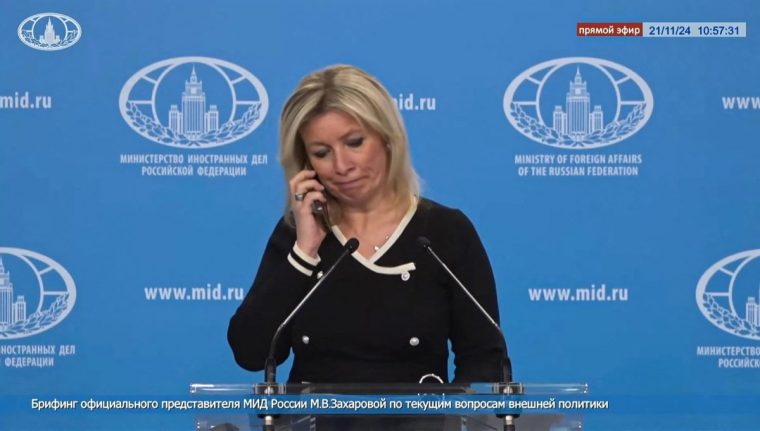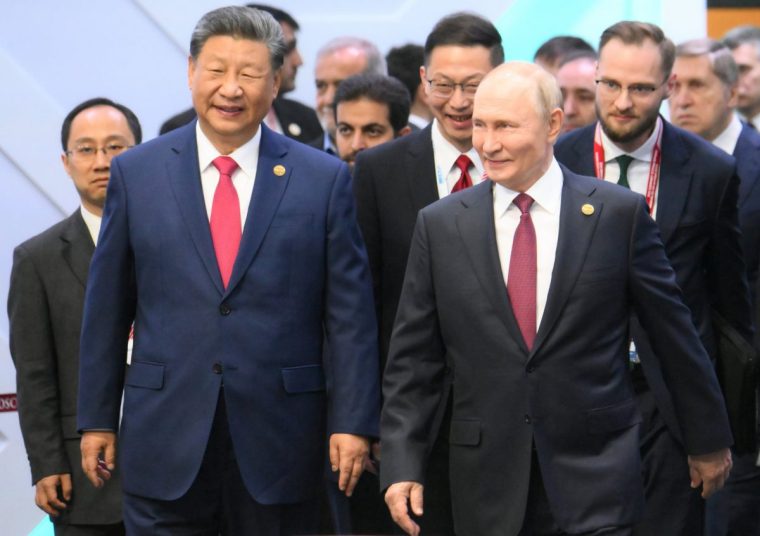We’re used to hearing bellicose rhetoric from the Kremlin. Its messaging over the past few months has followed an increasingly predictable script of threats, warnings, and accusations.
But Vladimir Putin’s televised address on Thursday night was different. Together with developments on the battlefield, it feels like a very significant moment in the conflict.
Firstly, the threat itself – that Moscow has the right to attack those countries (Britain and America) which allow Ukraine to fire their weapons on Russian soil. This is new.
Putin’s justification is that the UK and the US are now directly involved in the conflict, following their green light to Kyiv to use long range missiles, Storm Shadows and ATACMS on strikes inside Russia. The Kremlin leader claims it’s not just weapons and permission they’re giving to Ukraine, but satellite capabilities and operational aspects too.
We’ve heard that reasoning before, but the attached threat has always been undefined. This time, it’s more specific.
Secondly, the threat was reinforced by the use of a new weapon on the battlefield – a hypersonic, medium-range ballistic missile on a military facility in Dnipro.
The Russian president claimed it can travel ten times the speed of sound and is capable of evading existing missile defence systems.
Thursday’s strike involved a non-nuclear payload, but the weapon is capable of carrying multiple nuclear warheads. This made the threat more visible and more concrete.
Thirdly, there was the setting. Vladimir Putin chose to announce all this in a televised address, a format usually reserved for moments of national significance. For example, that’s how he addressed the public when he launched the so-called Special Military Operation back in February 2022.
It adds up to what feels like an attempt by the Kremlin to articulate its threats differently and to make them more meaningful and menacing.
That explains the somewhat bizarre moment earlier on Thursday when Russia’s notoriously sharp-tongued Ministry of Foreign Affairs spokeswoman, Maria Zakharova, interrupted her own press briefing to answer a telephone call.

At that stage, Moscow hadn’t addressed the reports that Russia had fired a new type of missile. The unidentified voice on the other end of the line could be heard telling her not to comment in the event she was asked. If she had, it would’ve undermined the gravity of the presidential address later that evening.
The choreography clearly mattered to the Kremlin – this was a moment for the world to sit up and take notice.
Will it work? Will the West do as Vladimir Putin wants and stand down? I don’t think so.
London and Washington must have known their move on long-range missiles would result in the accusation they are participating in the conflict.
They would have also known that Vladimir Putin had to do something. Having made so many threats in the build-up to this moment, doing nothing was not an option. So, in that sense, it won’t be a surprise.
The calculation seems to be that this is more bluff from the Kremlin leader. It’s true that he has given himself the option of a nuclear strike, after approving changes to Russia’s nuclear doctrine, which lower the threshold for the use of atomic weapons.
The key change is that Moscow could consider a nuclear strike if it’s attacked by any state using conventional weapons, including drones, missiles, and aircraft.
In short, British and American missiles fired by Ukraine meet the new criteria.
But there are compelling reasons as to why he won’t go down that route, or indeed target the UK or the US, the lesser of his recent warnings.
For one, Russia would be seriously outgunned in a direct fight with Nato. The belief is they’re not going to launch a war they know they would lose.
Secondly, Russia’s main ally, China, wouldn’t tolerate it. And thirdly, Moscow doesn’t want to risk upsetting the new White House administration.

The signs so far are that Donald Trump will stick to his promise and pursue a swift conclusion to the conflict, which would likely be in Russia’s favour. Launching a nuclear weapon now, or an attack on American assets, will derail that.
Having his bluff called will result in some loss of face for Putin, but it would be outweighed by the long-term benefits of a deal he could sell as a victory over the West.
There is always a chance, however, that Russia could do the unthinkable. It is a country full of surprises, with a leader who likes to defy expectations. Just think back to the full-scale invasion—few predicted Putin would actually go through with it.

Grindr must act but there are darker reasons why children are on the dating app